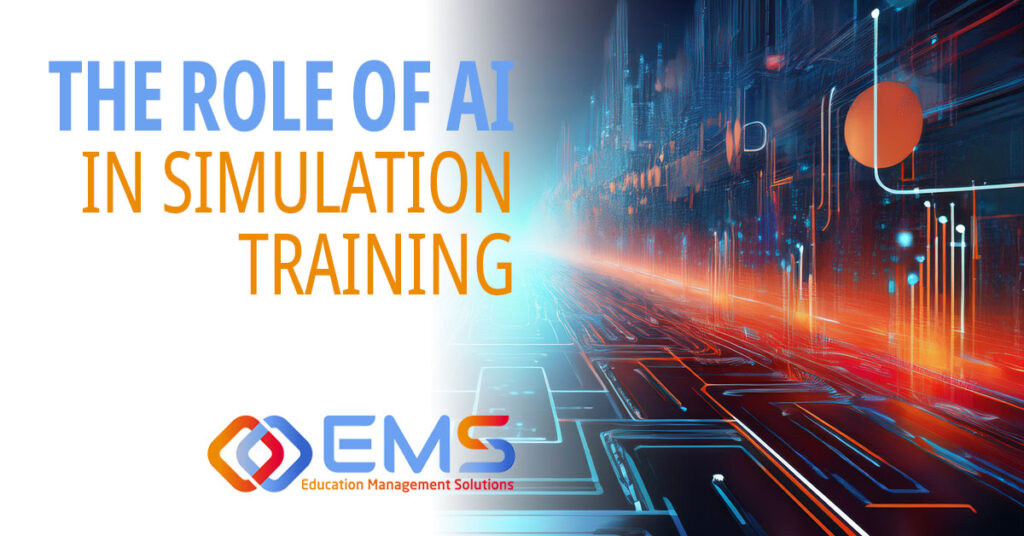Artificial Intelligence (AI) stands at the forefront of revolutionary tools that will reshape the future of healthcare training across every health profession. The increasingly rapid integration of AI promises a leap forward more effective training, enhanced learning outcomes, and, ultimately, superior patient care.
Simulation plays a pivotal role in healthcare education, offering a safe environment for students to hone their skills. With AI’s advent, the healthcare training industry is on the cusp of transforming more traditional simulated environments into highly adaptive and personalized learning experiences. But how will these gains be realized in simulation education, and what are the potential pitfalls to avoid during the adoption of this burgeoning technology?
The Difference Between AI and Machine Learning
AI refers to computer systems designed to mimic human intelligence—making decisions, solving problems, and learning from data. Machine Learning (ML), a subset of AI, focuses on creating algorithms that enable these systems to learn and improve from experience without explicit programming.
Although the use of AI and ML has seen application in various sectors like radiology and surgery, its foray into healthcare education, particularly simulation, represents a burgeoning field ripe with potential. From developing interprofessional communication skills to teaching clinical procedures, AI-driven simulation education is beginning to take shape. This technological integration aims to personalize instruction, improve clinical decision-making skills, and create realistic, adaptive training environments.
The Immediate Horizon
One of the immediate prospects includes AI-driven virtual reality (VR) and simulation products that offer realistic scenarios mimicking clinical encounters. These virtual patients, powered by AI, can react and adapt to learners’ actions, thus providing a dynamic, challenging, and growth-oriented training environment. The application of these simulations extends to practicing rare or high-risk procedures, ensuring that healthcare professionals are well-prepared before encountering such scenarios in real life.
Crucially, AI technologies can analyze learners’ decisions and thought processes, offering tailored feedback and pinpointing areas for improvement. This bespoke approach to learning enables the optimization of educational experiences, ensuring that learners acquire essential competencies at their own pace.
Navigating Challenges and Looking Ahead
Despite the enthusiasm, the integration of AI into simulation-based learning is not without its challenges. Technical hurdles, the need for substantial investment in infrastructure, and resistance from educators and students unfamiliar with AI are significant considerations. Moreover, AI technologies cannot wholly replace the invaluable human element in education—highlighting the need for a seamless collaboration between AI experts, educators, and healthcare professionals.
The Future of AI in Healthcare Education
As we forge ahead, the role of AI in simulation-based learning is undeniable. However, realizing its full potential requires a concerted effort from educators, technologists, and healthcare professionals alike. This partnership is vital in ensuring that the nuances of practical healthcare are captured and that these technologies serve to enhance rather than supplant traditional education methods.
In essence, the integration of AI into simulation education heralds a new era in healthcare education. It promises enhanced personalized learning, fosters critical thinking, and prepares healthcare practitioners to excel in an increasingly complex healthcare landscape. As we navigate this promising frontier, a balanced approach—melding technology with the irreplaceable human touch—will be paramount in leveraging AI for the betterment of healthcare education and, by extension, patient care.
With this advent in mind, the choice of a partner equipped to deliver cutting-edge simulation solutions becomes paramount. Education Management Solutions (EMS) stands at the forefront of this evolution, providing robust simulation technologies that can take advantage of AI and cater to the nuanced needs of higher education, healthcare systems, and government institutions. Leverage EMS’s expertise to propel your institution into the future of healthcare education, where the integration of technology and training paves the way for unparalleled success.

